人教版九年级全册期末复习Unit12Life is full of the unexpected. 单元考点汇总练习 (无答案)
文档属性
| 名称 | 人教版九年级全册期末复习Unit12Life is full of the unexpected. 单元考点汇总练习 (无答案) | 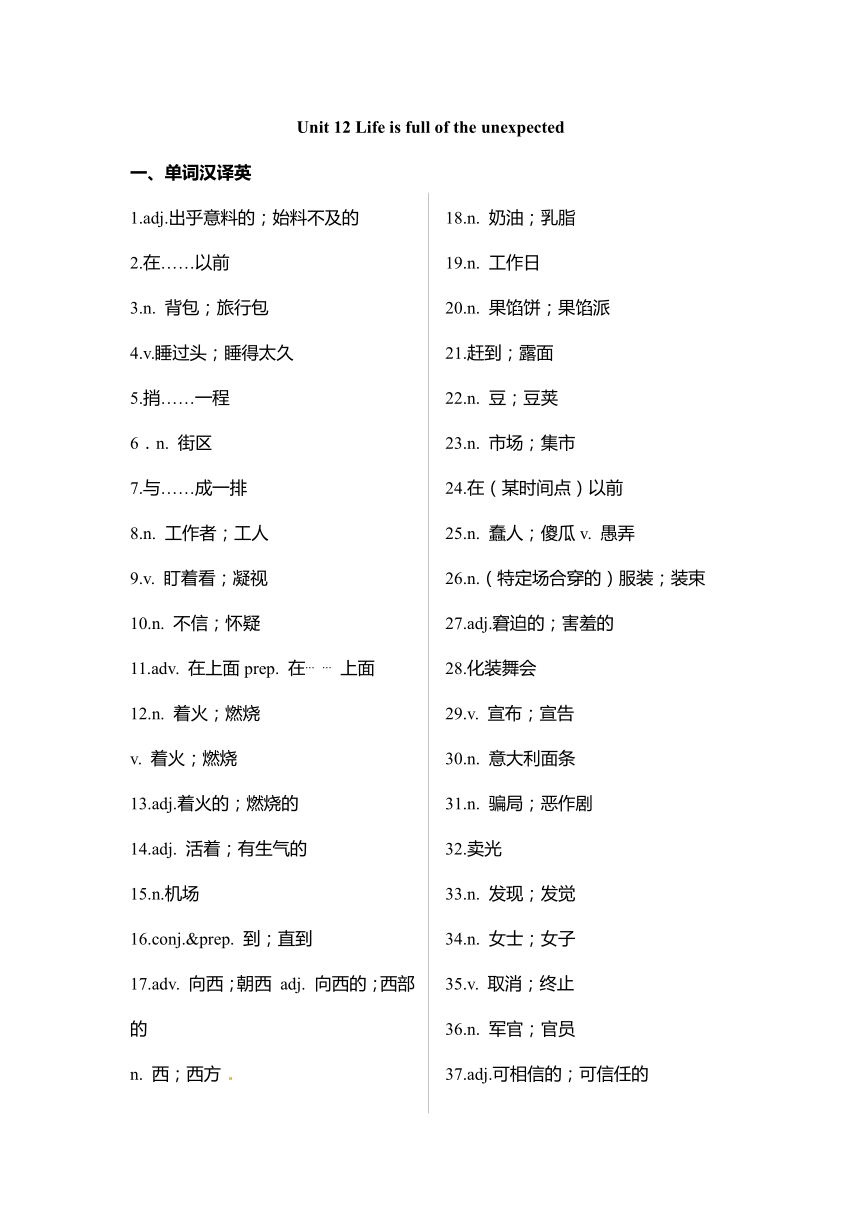 | |
| 格式 | docx | ||
| 文件大小 | 39.6KB | ||
| 资源类型 | 教案 | ||
| 版本资源 | 人教新目标(Go for it)版 | ||
| 科目 | 英语 | ||
| 更新时间 | 2024-01-15 11:16:07 | ||
图片预览

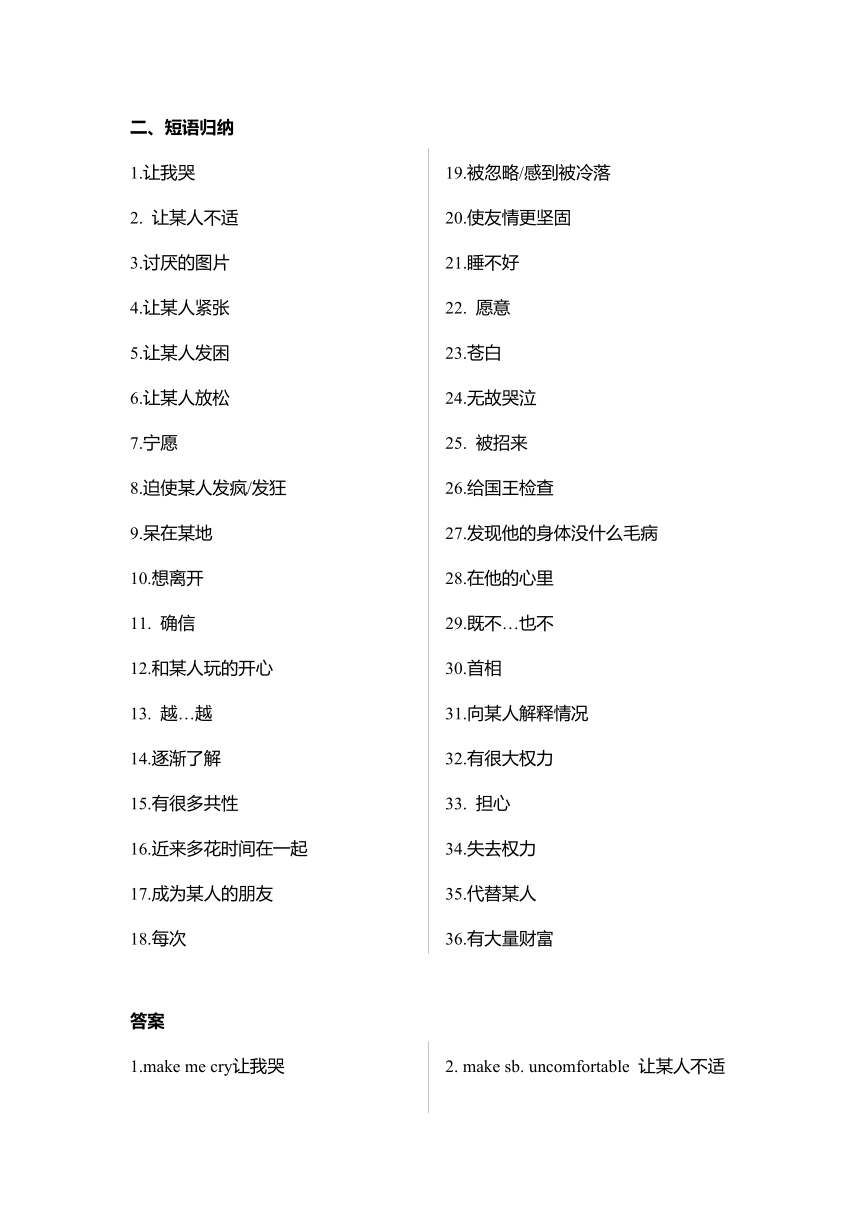
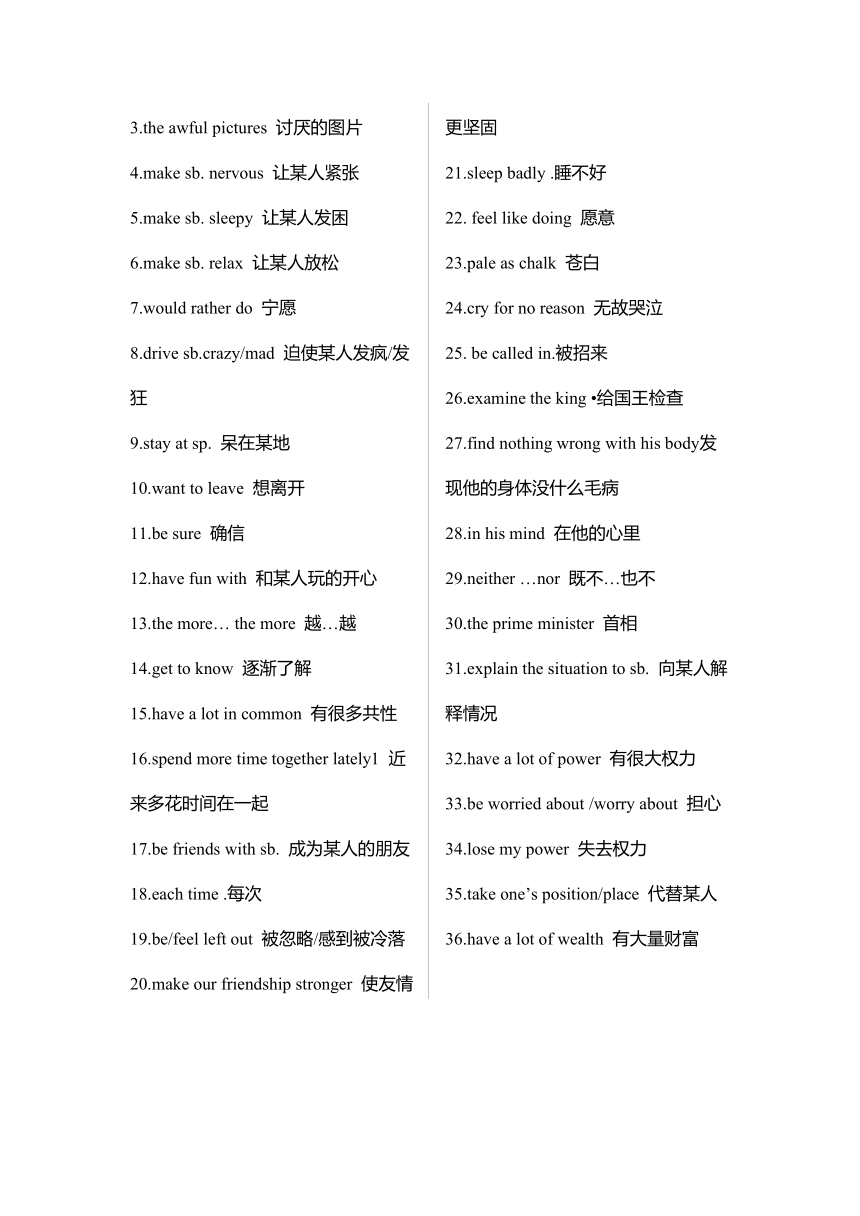
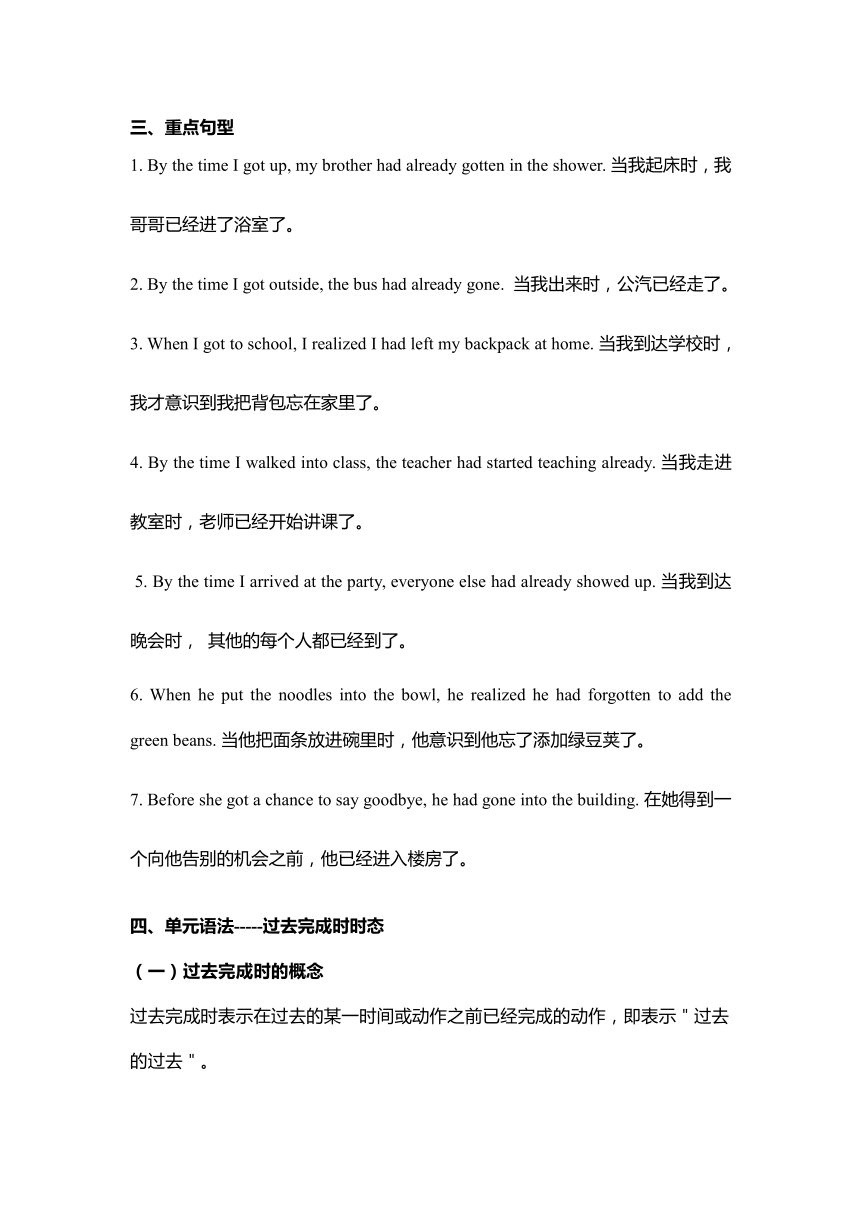
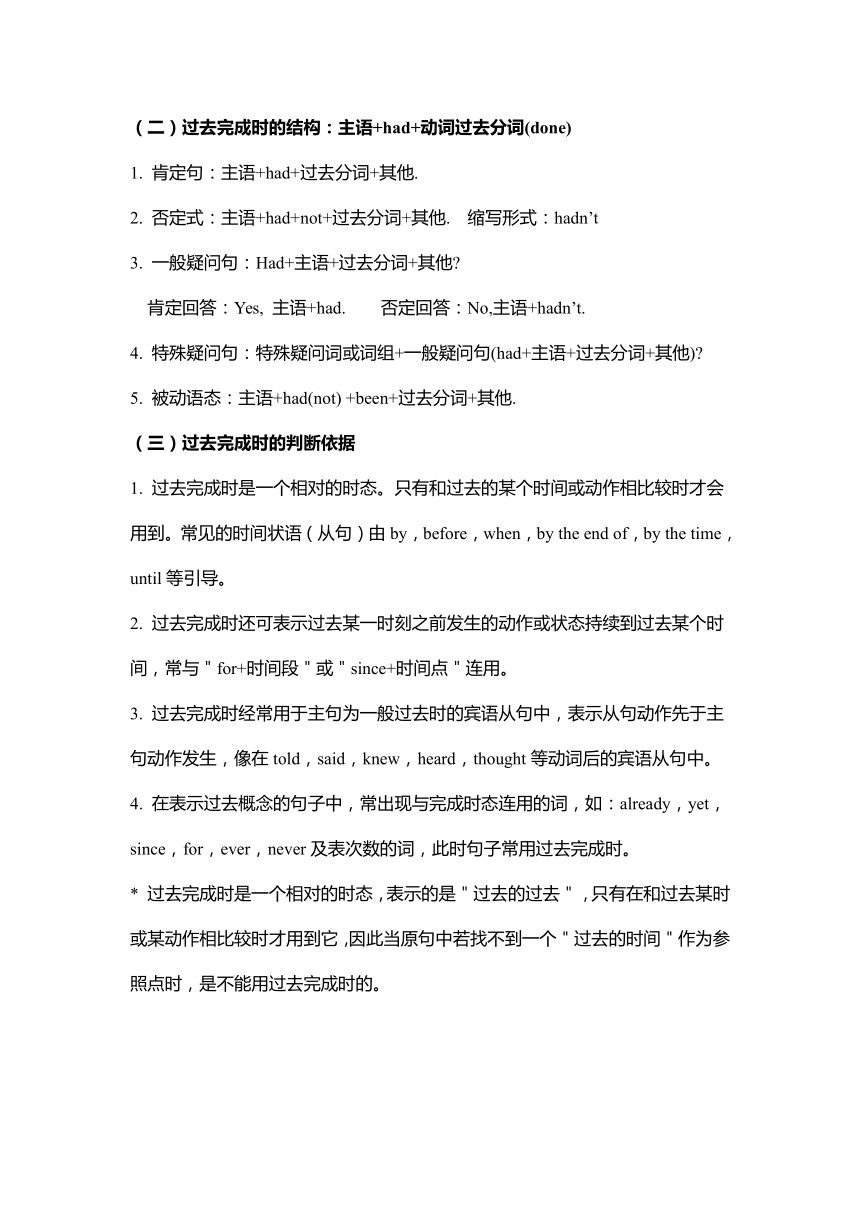
文档简介
Unit 12 Life is full of the unexpected
单词汉译英
1.adj.出乎意料的;始料不及的
2.在……以前
3.n. 背包;旅行包
4.v.睡过头;睡得太久
5.捎……一程
6.n. 街区
7.与……成一排
8.n. 工作者;工人
9.v. 盯着看;凝视
10.n. 不信;怀疑
11.adv. 在上面prep. 在 上面
12.n. 着火;燃烧
v. 着火;燃烧
13.adj.着火的;燃烧的
14.adj. 活着;有生气的
15.n.机场
16.conj.&prep. 到;直到
17.adv. 向西;朝西 adj. 向西的;西部的
n. 西;西方
18.n. 奶油;乳脂
19.n. 工作日
20.n. 果馅饼;果馅派
21.赶到;露面
22.n. 豆;豆荚
23.n. 市场;集市
24.在(某时间点)以前
25.n. 蠢人;傻瓜v. 愚弄
26.n.(特定场合穿的)服装;装束
27.adj.窘迫的;害羞的
28.化装舞会
29.v. 宣布;宣告
30.n. 意大利面条
31.n. 骗局;恶作剧
32.卖光
33.n. 发现;发觉
34.n. 女士;女子
35.v. 取消;终止
36.n. 军官;官员
37.adj.可相信的;可信任的
二、短语归纳
1.让我哭
2. 让某人不适
3.讨厌的图片
4.让某人紧张
5.让某人发困
6.让某人放松
7.宁愿
8.迫使某人发疯/发狂
9.呆在某地
10.想离开
11. 确信
12.和某人玩的开心
13. 越…越
14.逐渐了解
15.有很多共性
16.近来多花时间在一起
17.成为某人的朋友
18.每次
19.被忽略/感到被冷落
20.使友情更坚固
21.睡不好
22. 愿意
23.苍白
24.无故哭泣
25. 被招来
26.给国王检查
27.发现他的身体没什么毛病
28.在他的心里
29.既不…也不
30.首相
31.向某人解释情况
32.有很大权力
33. 担心
34.失去权力
35.代替某人
36.有大量财富
答案
1.make me cry让我哭
2. make sb. uncomfortable 让某人不适
3.the awful pictures 讨厌的图片
4.make sb. nervous 让某人紧张
5.make sb. sleepy 让某人发困
6.make sb. relax 让某人放松
7.would rather do 宁愿
8.drive sb.crazy/mad 迫使某人发疯/发狂
9.stay at sp. 呆在某地
10.want to leave 想离开
11.be sure 确信
12.have fun with 和某人玩的开心
13.the more… the more 越…越
14.get to know 逐渐了解
15.have a lot in common 有很多共性
16.spend more time together lately1 近来多花时间在一起
17.be friends with sb. 成为某人的朋友
18.each time .每次
19.be/feel left out 被忽略/感到被冷落
20.make our friendship stronger 使友情更坚固
21.sleep badly .睡不好
22. feel like doing 愿意
23.pale as chalk 苍白
24.cry for no reason 无故哭泣
25. be called in.被招来
26.examine the king 给国王检查
27.find nothing wrong with his body发现他的身体没什么毛病
28.in his mind 在他的心里
29.neither …nor 既不…也不
30.the prime minister 首相
31.explain the situation to sb. 向某人解释情况
32.have a lot of power 有很大权力
33.be worried about /worry about 担心
34.lose my power 失去权力
35.take one’s position/place 代替某人
36.have a lot of wealth 有大量财富
三、重点句型
1. By the time I got up, my brother had already gotten in the shower. 当我起床时,我哥哥已经进了浴室了。
2. By the time I got outside, the bus had already gone. 当我出来时,公汽已经走了。
3. When I got to school, I realized I had left my backpack at home. 当我到达学校时,我才意识到我把背包忘在家里了。
4. By the time I walked into class, the teacher had started teaching already. 当我走进教室时,老师已经开始讲课了。
5. By the time I arrived at the party, everyone else had already showed up. 当我到达晚会时, 其他的每个人都已经到了。
6. When he put the noodles into the bowl, he realized he had forgotten to add the green beans. 当他把面条放进碗里时,他意识到他忘了添加绿豆荚了。
7. Before she got a chance to say goodbye, he had gone into the building. 在她得到一个向他告别的机会之前,他已经进入楼房了。
四、单元语法-----过去完成时时态
(一)过去完成时的概念
过去完成时表示在过去的某一时间或动作之前已经完成的动作,即表示"过去的过去"。
(二)过去完成时的结构:主语+had+动词过去分词(done)
1. 肯定句:主语+had+过去分词+其他.
2. 否定式:主语+had+not+过去分词+其他. 缩写形式:hadn’t
3. 一般疑问句:Had+主语+过去分词+其他
肯定回答:Yes, 主语+had. 否定回答:No,主语+hadn’t.
4. 特殊疑问句:特殊疑问词或词组+一般疑问句(had+主语+过去分词+其他)
5. 被动语态:主语+had(not) +been+过去分词+其他.
(三)过去完成时的判断依据
1. 过去完成时是一个相对的时态。只有和过去的某个时间或动作相比较时才会用到。常见的时间状语(从句)由by,before,when,by the end of,by the time,until等引导。
2. 过去完成时还可表示过去某一时刻之前发生的动作或状态持续到过去某个时间,常与"for+时间段"或"since+时间点"连用。
3. 过去完成时经常用于主句为一般过去时的宾语从句中,表示从句动作先于主句动作发生,像在told,said,knew,heard,thought等动词后的宾语从句中。
4. 在表示过去概念的句子中,常出现与完成时态连用的词,如:already,yet,since,for,ever,never及表次数的词,此时句子常用过去完成时。
* 过去完成时是一个相对的时态,表示的是"过去的过去",只有在和过去某时或某动作相比较时才用到它,因此当原句中若找不到一个"过去的时间"作为参照点时,是不能用过去完成时的。
练习
一、单项选择
1.The meeting ________ by the time I got there yesterday.
A.was on B.has been on C.had begun D.has begun
2.By the end of last week, she ______ in the west of China for two months helping the homeless children.
A.will stay B.has stayed C.would stay D.had stayed
3.The food I cook isn't delicious, but ________ I can look after myself.
A.at first B.at last C.at least D.at once
4.— I'm sorry I ____ my exercise book at home this morning.
— It doesn't matter. Don't forget ________ it here this afternoon.
A.left; to take B.forgot; bringing C.left; to bring D.forgot; to bring
5.Our teachers are very friendly to us. We ____ friends since three years ago.
A.have been B.have become C.would be
6.—When did Bob and Victor arrive at the meeting
—They were late. They didn’t ________ until three o’clock.
A.fix up B.grow up C.take up D.show up
7.—No one can tell when they ________.
—When they ________, I’ll let you know at once.
return; will arrive B.will return; reach
C.will return; arrive D.returns; reach
8.—It’s everyone’s duty to join the Clean Your Plate Campaign (光盘行动).
—Sure. We should try to ________ all the food that we’ve ordered.
A.give up B.eat up C.turn up D.show up
9.—Dad, where is the dog I can’t find it.
—Hah, you can’t see it because it is ________ the big tree.
A.beside B.behind C.above D.opposite
10.The ________ of the Sanxingdui Ruins site(三星堆遗址)shocked the world.
A.discovery B.development C.disbelief D.Difference
二、阅读
My grandfather is eighty years old now. He always complains about how fast things have changed, and he often says that life used to be better.
Families aren’t families they used to be. A lot of families have broken up. If husband and wife have problems with their marriage, they no longer stay together. And mothers used to stay at home and take care of their children, but now not any more. Everyone is busy working. Mother used to spend all day cooking in the kitchen. But now the family don’t eat home-cooked food any more.
And the cars! No one walks any more. More and more people drive. Students used to walk 5 miles to school every day, even in winter. But now students don’t. And in school, children don’t have to think any more. In math class, for example, they used to add, subtract, multiply and divide (加减乘除) in their heads. Instead, they use calculators (计算器).
And people today have TV and computers, and they don’t talk to each other any more. They are too busy to talk, too busy to eat, too busy to think…..
Life used to be simple, but it isn’t any more.
1.What does my grandfather think of the life now
A.He thinks the life now is very good.
B.He thinks the life now is worse than it used to be.
C.He thinks the life now is better than it used to be.
D.He thinks the life is the same as it used to be.
2.What does the underlined word “marriage” mean in Chinese
A.生活 B.工作 C.婚姻 D.家庭
3.What has happened these years according to the passage
A.Children don’t have to think any more in school.
B.Students use calculators in math class.
C.Some used to walk to school, but now they don’t.
D.All of above.
4.What changes have happened to some families
a. People have TV.
b. People like to eat home-cooked food.
c. Lots of families have computers.
d. Lots of couples (夫妇) live apart because of unhappy problems.
A.a, b, d B.b, c, d C.a, b, c D.a, c, d
5.Which is TRUE according to the passage
A.Life now is much simpler.
B.People have too much time to talk with each other now.
C.The writer’s grandfather only complains and pays no attention to better life now.
D.Lots of mothers stay at home and look after their children.
三、用所给词的适当形式填空
1.The story was so (believe) that thousands of people left their homes.
2.The rainbow(彩虹) is beautiful, but it often (appear) soon.
3.Jimmy is only ten. He often asked some (embarrass) questions.
4.The (end) of the novel is very surprising.
5.Chairman Xi Jinping's orders were not (expect).
6.It’s impolite to make ________ (noise) while eating noodles.
7.By reading this article, we can learn about table ________ (manner).
8.At that time, all the questions ________ (crowd) my mind.
9.When I first ate in a ________ (west) restaurant, I didn’t know what to do.
10.We should speak to old people ________ (polite).
四、根据句意及汉语提示,完成句中所缺单词。
1.I began feeling (尴尬的) when I realized that I had made such a stupid mistake.
2.I (取消)my appointment with a dentist yesterday because of the bad weather.
3.The message was so (可相信的)that everyone in our class believed it.
4.Don't tell a lie! Nobody should be (愚弄).
5.The (发现) of oil in Shandong was exciting news.
6.________ (女士)and gentlemen, it is time to begin.
7.Tom is a ________ (可相信的) person, so you can trust him.
8.How do you ________ (感觉) about going to the cinema
9.Were you ________ (愚弄) by others on April Fool’s Day
10.The result was ________ (出乎意料) and nobody believed it.
单词汉译英
1.adj.出乎意料的;始料不及的
2.在……以前
3.n. 背包;旅行包
4.v.睡过头;睡得太久
5.捎……一程
6.n. 街区
7.与……成一排
8.n. 工作者;工人
9.v. 盯着看;凝视
10.n. 不信;怀疑
11.adv. 在上面prep. 在 上面
12.n. 着火;燃烧
v. 着火;燃烧
13.adj.着火的;燃烧的
14.adj. 活着;有生气的
15.n.机场
16.conj.&prep. 到;直到
17.adv. 向西;朝西 adj. 向西的;西部的
n. 西;西方
18.n. 奶油;乳脂
19.n. 工作日
20.n. 果馅饼;果馅派
21.赶到;露面
22.n. 豆;豆荚
23.n. 市场;集市
24.在(某时间点)以前
25.n. 蠢人;傻瓜v. 愚弄
26.n.(特定场合穿的)服装;装束
27.adj.窘迫的;害羞的
28.化装舞会
29.v. 宣布;宣告
30.n. 意大利面条
31.n. 骗局;恶作剧
32.卖光
33.n. 发现;发觉
34.n. 女士;女子
35.v. 取消;终止
36.n. 军官;官员
37.adj.可相信的;可信任的
二、短语归纳
1.让我哭
2. 让某人不适
3.讨厌的图片
4.让某人紧张
5.让某人发困
6.让某人放松
7.宁愿
8.迫使某人发疯/发狂
9.呆在某地
10.想离开
11. 确信
12.和某人玩的开心
13. 越…越
14.逐渐了解
15.有很多共性
16.近来多花时间在一起
17.成为某人的朋友
18.每次
19.被忽略/感到被冷落
20.使友情更坚固
21.睡不好
22. 愿意
23.苍白
24.无故哭泣
25. 被招来
26.给国王检查
27.发现他的身体没什么毛病
28.在他的心里
29.既不…也不
30.首相
31.向某人解释情况
32.有很大权力
33. 担心
34.失去权力
35.代替某人
36.有大量财富
答案
1.make me cry让我哭
2. make sb. uncomfortable 让某人不适
3.the awful pictures 讨厌的图片
4.make sb. nervous 让某人紧张
5.make sb. sleepy 让某人发困
6.make sb. relax 让某人放松
7.would rather do 宁愿
8.drive sb.crazy/mad 迫使某人发疯/发狂
9.stay at sp. 呆在某地
10.want to leave 想离开
11.be sure 确信
12.have fun with 和某人玩的开心
13.the more… the more 越…越
14.get to know 逐渐了解
15.have a lot in common 有很多共性
16.spend more time together lately1 近来多花时间在一起
17.be friends with sb. 成为某人的朋友
18.each time .每次
19.be/feel left out 被忽略/感到被冷落
20.make our friendship stronger 使友情更坚固
21.sleep badly .睡不好
22. feel like doing 愿意
23.pale as chalk 苍白
24.cry for no reason 无故哭泣
25. be called in.被招来
26.examine the king 给国王检查
27.find nothing wrong with his body发现他的身体没什么毛病
28.in his mind 在他的心里
29.neither …nor 既不…也不
30.the prime minister 首相
31.explain the situation to sb. 向某人解释情况
32.have a lot of power 有很大权力
33.be worried about /worry about 担心
34.lose my power 失去权力
35.take one’s position/place 代替某人
36.have a lot of wealth 有大量财富
三、重点句型
1. By the time I got up, my brother had already gotten in the shower. 当我起床时,我哥哥已经进了浴室了。
2. By the time I got outside, the bus had already gone. 当我出来时,公汽已经走了。
3. When I got to school, I realized I had left my backpack at home. 当我到达学校时,我才意识到我把背包忘在家里了。
4. By the time I walked into class, the teacher had started teaching already. 当我走进教室时,老师已经开始讲课了。
5. By the time I arrived at the party, everyone else had already showed up. 当我到达晚会时, 其他的每个人都已经到了。
6. When he put the noodles into the bowl, he realized he had forgotten to add the green beans. 当他把面条放进碗里时,他意识到他忘了添加绿豆荚了。
7. Before she got a chance to say goodbye, he had gone into the building. 在她得到一个向他告别的机会之前,他已经进入楼房了。
四、单元语法-----过去完成时时态
(一)过去完成时的概念
过去完成时表示在过去的某一时间或动作之前已经完成的动作,即表示"过去的过去"。
(二)过去完成时的结构:主语+had+动词过去分词(done)
1. 肯定句:主语+had+过去分词+其他.
2. 否定式:主语+had+not+过去分词+其他. 缩写形式:hadn’t
3. 一般疑问句:Had+主语+过去分词+其他
肯定回答:Yes, 主语+had. 否定回答:No,主语+hadn’t.
4. 特殊疑问句:特殊疑问词或词组+一般疑问句(had+主语+过去分词+其他)
5. 被动语态:主语+had(not) +been+过去分词+其他.
(三)过去完成时的判断依据
1. 过去完成时是一个相对的时态。只有和过去的某个时间或动作相比较时才会用到。常见的时间状语(从句)由by,before,when,by the end of,by the time,until等引导。
2. 过去完成时还可表示过去某一时刻之前发生的动作或状态持续到过去某个时间,常与"for+时间段"或"since+时间点"连用。
3. 过去完成时经常用于主句为一般过去时的宾语从句中,表示从句动作先于主句动作发生,像在told,said,knew,heard,thought等动词后的宾语从句中。
4. 在表示过去概念的句子中,常出现与完成时态连用的词,如:already,yet,since,for,ever,never及表次数的词,此时句子常用过去完成时。
* 过去完成时是一个相对的时态,表示的是"过去的过去",只有在和过去某时或某动作相比较时才用到它,因此当原句中若找不到一个"过去的时间"作为参照点时,是不能用过去完成时的。
练习
一、单项选择
1.The meeting ________ by the time I got there yesterday.
A.was on B.has been on C.had begun D.has begun
2.By the end of last week, she ______ in the west of China for two months helping the homeless children.
A.will stay B.has stayed C.would stay D.had stayed
3.The food I cook isn't delicious, but ________ I can look after myself.
A.at first B.at last C.at least D.at once
4.— I'm sorry I ____ my exercise book at home this morning.
— It doesn't matter. Don't forget ________ it here this afternoon.
A.left; to take B.forgot; bringing C.left; to bring D.forgot; to bring
5.Our teachers are very friendly to us. We ____ friends since three years ago.
A.have been B.have become C.would be
6.—When did Bob and Victor arrive at the meeting
—They were late. They didn’t ________ until three o’clock.
A.fix up B.grow up C.take up D.show up
7.—No one can tell when they ________.
—When they ________, I’ll let you know at once.
return; will arrive B.will return; reach
C.will return; arrive D.returns; reach
8.—It’s everyone’s duty to join the Clean Your Plate Campaign (光盘行动).
—Sure. We should try to ________ all the food that we’ve ordered.
A.give up B.eat up C.turn up D.show up
9.—Dad, where is the dog I can’t find it.
—Hah, you can’t see it because it is ________ the big tree.
A.beside B.behind C.above D.opposite
10.The ________ of the Sanxingdui Ruins site(三星堆遗址)shocked the world.
A.discovery B.development C.disbelief D.Difference
二、阅读
My grandfather is eighty years old now. He always complains about how fast things have changed, and he often says that life used to be better.
Families aren’t families they used to be. A lot of families have broken up. If husband and wife have problems with their marriage, they no longer stay together. And mothers used to stay at home and take care of their children, but now not any more. Everyone is busy working. Mother used to spend all day cooking in the kitchen. But now the family don’t eat home-cooked food any more.
And the cars! No one walks any more. More and more people drive. Students used to walk 5 miles to school every day, even in winter. But now students don’t. And in school, children don’t have to think any more. In math class, for example, they used to add, subtract, multiply and divide (加减乘除) in their heads. Instead, they use calculators (计算器).
And people today have TV and computers, and they don’t talk to each other any more. They are too busy to talk, too busy to eat, too busy to think…..
Life used to be simple, but it isn’t any more.
1.What does my grandfather think of the life now
A.He thinks the life now is very good.
B.He thinks the life now is worse than it used to be.
C.He thinks the life now is better than it used to be.
D.He thinks the life is the same as it used to be.
2.What does the underlined word “marriage” mean in Chinese
A.生活 B.工作 C.婚姻 D.家庭
3.What has happened these years according to the passage
A.Children don’t have to think any more in school.
B.Students use calculators in math class.
C.Some used to walk to school, but now they don’t.
D.All of above.
4.What changes have happened to some families
a. People have TV.
b. People like to eat home-cooked food.
c. Lots of families have computers.
d. Lots of couples (夫妇) live apart because of unhappy problems.
A.a, b, d B.b, c, d C.a, b, c D.a, c, d
5.Which is TRUE according to the passage
A.Life now is much simpler.
B.People have too much time to talk with each other now.
C.The writer’s grandfather only complains and pays no attention to better life now.
D.Lots of mothers stay at home and look after their children.
三、用所给词的适当形式填空
1.The story was so (believe) that thousands of people left their homes.
2.The rainbow(彩虹) is beautiful, but it often (appear) soon.
3.Jimmy is only ten. He often asked some (embarrass) questions.
4.The (end) of the novel is very surprising.
5.Chairman Xi Jinping's orders were not (expect).
6.It’s impolite to make ________ (noise) while eating noodles.
7.By reading this article, we can learn about table ________ (manner).
8.At that time, all the questions ________ (crowd) my mind.
9.When I first ate in a ________ (west) restaurant, I didn’t know what to do.
10.We should speak to old people ________ (polite).
四、根据句意及汉语提示,完成句中所缺单词。
1.I began feeling (尴尬的) when I realized that I had made such a stupid mistake.
2.I (取消)my appointment with a dentist yesterday because of the bad weather.
3.The message was so (可相信的)that everyone in our class believed it.
4.Don't tell a lie! Nobody should be (愚弄).
5.The (发现) of oil in Shandong was exciting news.
6.________ (女士)and gentlemen, it is time to begin.
7.Tom is a ________ (可相信的) person, so you can trust him.
8.How do you ________ (感觉) about going to the cinema
9.Were you ________ (愚弄) by others on April Fool’s Day
10.The result was ________ (出乎意料) and nobody believed it.
同课章节目录
- Unit 1 How can we become good learners.
- Section A
- Section B
- Unit 2 I think that mooncakes are delicious!
- Section A
- Section B
- Unit 3 Could you please tell me where the restroom
- Section A
- Section B
- Unit 4 I used to be afraid of the dark.
- Section A
- Section B
- Unit 5 What are the shirts made of?
- Section A
- Section B
- Review of Units 1-5
- Unit 6 When was it invented?
- Section A
- Section B
- Unit 7 Teenagers should be allowed to choose their
- Section A
- Section B
- Unit 8 It must belong to Carla.
- Section A
- Section B
- Unit 9 I like music that I can dance to.
- Section A
- Section B
- Unit 10 You're supposed to shake hands.
- Section A
- Section B
- Review of Units 6-10
- Unit 11 Sad movies make me cry.
- Section A
- Section B
- Unit 12 Life is full of the unexpected
- Section A
- Section B
- Unit 13 We're trying to save the earth!
- Section A
- Section B
- Unit 14 I remember meeting all of you in Grade 7.
- Section A
- Section B
- Review of Units 11-14
